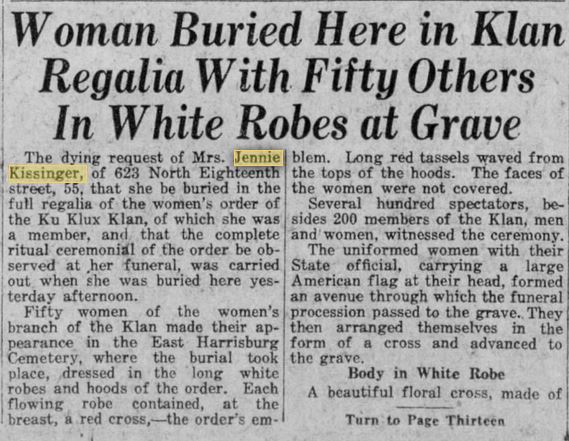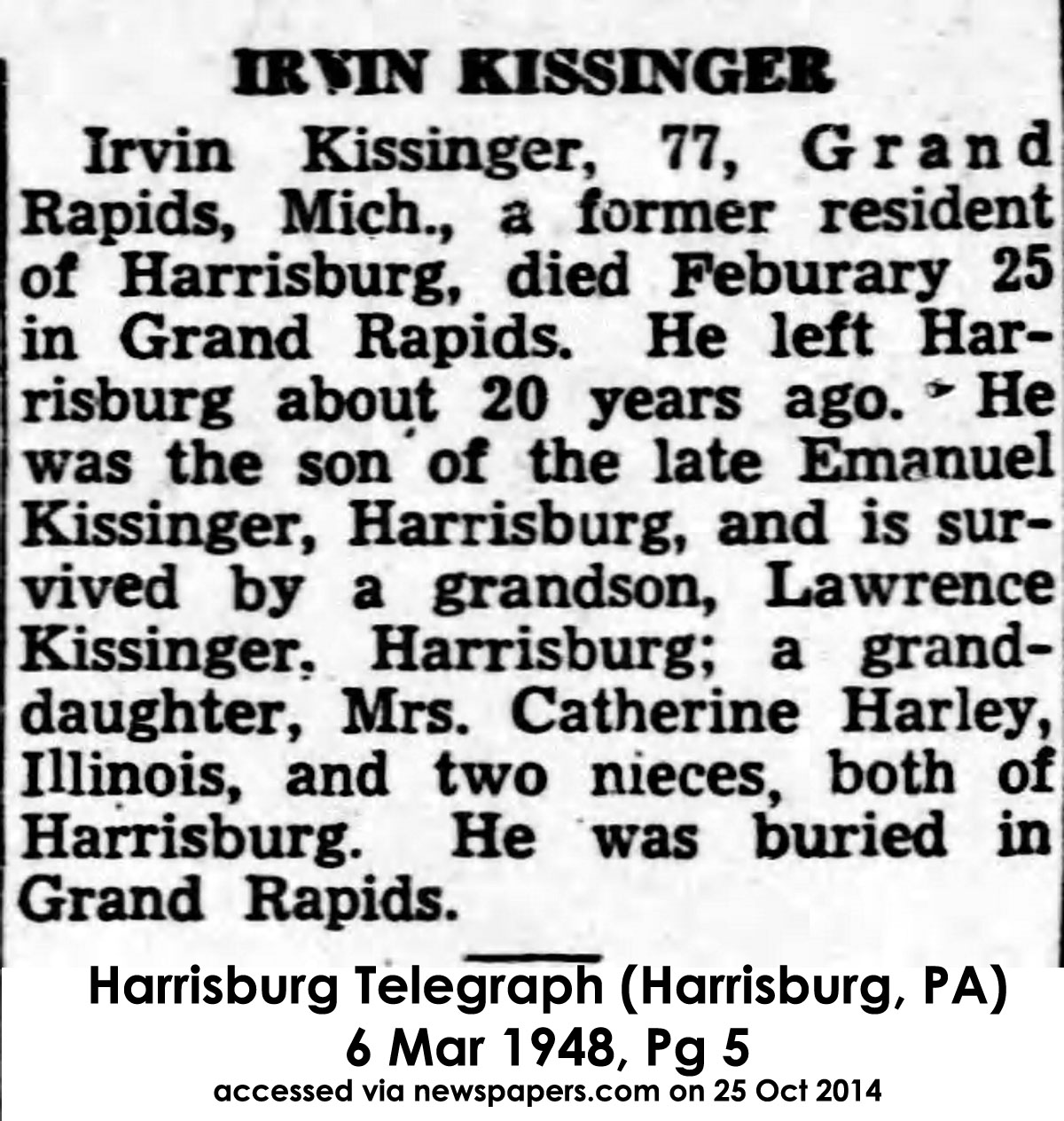Jennie Kissinger – Buried in Her Ku Klux Klan Robes
Posted By Norman Gasbarro on January 27, 2016
Today’s post will begin to document numerous instances of hate and violence in Dauphin County which occurred before, during, and after the Civil War. This includes actions by individuals, by political parties, by social groups, and by terror groups. A new blog topic, “Hate,” is being introduced with this post and other posts on this topic can be found by clicking on the word “Hate” in the “topics” category in the 2nd column of any page of the blog.
The presence of the Ku Klux Klan in Pennsylvania in the 1920s and 1930s has been briefly discussed here in past blog posts. What has not been mentioned before is that there were almost as many members of the Klan in Pennsylvania during that period than there were men from Pennsylvania who served in the Civil War during the early 1860s. The Klan had as members both men and women.
Jennie Kissinger was a member of the women’s auxiliary of one of the many the Ku Klux Klan groups in Dauphin County in the 1920s. When she died in 1925, her request that she be buried in her full Klan robe was honored by her husband Irvin Kissinger and by other members of her Klan group. Her funeral at the East Harrisburg Cemetery was attended by 250 Klan members, 50 of whom were in full regalia. As noted in one of the articles, the Harrisburg Mayor refused to grant permission for the Klan to hold the public ceremony, but no city officials interfered with the Klan ceremonies at the cemetery.
The Death and Funeral of Jennie Kissinger
The following article was from The Evening News (Harrisburg), 31 March 1925:
Woman Buried Here in Klan Regalia With Fifty Others in White Robes at Grave
The dying request of Mrs. Jennie Kissinger, of 623 North Eighteenth Street, 55, that she be buried in the full regalia of the women’s order of the Ku Klux Klan, of which she was a member, and that the complete ritual ceremonial of the order be observed at her funeral, was carried out when she was buried here yesterday afternoon.
Fifty women of the women’s branch of the Klan made their appearance in the East Harrisburg Cemetery, where the burial took place, dressed in the long white robes and hoods of the order. Each flowing robe contained, at the breast, a red cross, — the order’s emblem. Long red tassels waved from the tops of the hoods. The faces of the women were not covered.
Several hundred spectators, besides 200 members of the Klan, men and women, witnessed the ceremony.
The uniformed women, with their State official, carrying a large American flag at their head, formed an avenue through which the funeral procession passed to the grave. They then arranged themselves in the form of a cross and advanced to the grave.
Body in White Robe
A beautiful floral cross, made of red and white roses, bearing the inscription, “The Women of the Ku Klux Klan,” was placed at the head of the grave by one of the white-robed figures. The American flag was placed at the foot of the grave.
The body was dressed in the white robe of the order with the design of the red cross over the heart. The hood was placed on her head with the face uncovered just before the coffin was closed.
Following funeral services conducted by the Rev. H. F. Rhoad, Pastor of the United Brethren Church, Eighteenth and State Streets, Klan officials read from the Scriptures. The organization then sand in unison, “The Tie That Binds.”
The men’s branch of the Klan placed a large basket of white carnations, formed in a cross, on the grave.
Mrs. Kissinger died at her home Thursday morning. It was to her husband, Irvin Kissinger, at the final moment, that she made the request that the members of her order take charge of the funeral.
Her Dying Request
Kissinger said he first notified the order of his wife’s request and that members of the organization went to Mayor Hoverter to ask permission to hold the funeral. It was explained to the Mayor, he said, that it was not the intention of the Klan to parade through the streets in their robes but only to place them on at the cemetery.
“The Mayor refused to grant permission,” Kissinger continues, “but no efforts were made to interfere with the ceremony.”
Besides her husband, Mrs. Kissinger is survived by one son, Lawrence M. Kissinger.
Mrs. Kissinger died on 26 March 1925 and one of her obituaries referred to her Klan membership euphemistically as “connected with the Fraternal Organization” and did not mention the Klan ceremony that would be conducted at the cemetery. From the Harrisburg Telegraph, 27 March 1925:
MRS. JENNIE C. KISSINGER
Mrs. Jennie C. Kissinger, wife of Irvin M. Kissinger, died yesterday at her home, 623 North Eighteenth Street. She is survived by her husband. Death was caused by complications, following a brief illness. The funeral service will be private and will be held Monday afternoon at 3 o’clock in the chapel of Hoover and Son funeral parlors, 1413 North Second Street. The Rev. H. F. Rhoad, of the State Street United Brethren United Brethren Church, will officiate. Mrs. Kissinger was a member of the State Street, United Brethren Church, and was also connected with the Fraternal Organization. The body may be viewed Sunday night from 7 to 9 o’clock in the Hoover and Son Parlors. Burial will be in the East Harrisburg Cemetery.
Shortly after the death of his wife, Irvin Kissinger moved to Michigan and re-married. It is not known whether he moved there voluntarily or because he was ostracized for his and his wife’s support of the Ku Klux Klan in Dauphin County. Irvin Kissinger’s obituary appeared in the Harrisburg Telegraph, 6 March 1948:
IRVIN KISSINGER
Irvin Kissinger, 77, Grand Rapids, Michigan, a former resident of Harrisburg, died 25 February in Grand Rapids. He left Harrisburg about 20 Years ago. He was the son of the late Emanuel Kissinger, Harrisburg, and is survived by a grandson, Lawrence Kissinger, Harrisburg; a granddaughter, Mrs. Catherine Harley, Illinois, and two nieces, both of Harrisburg. He was buried in Grand Rapids.
Attempts at this juncture to connect either Jennie Kissinger or her husband Irvin to any Civil War soldiers in their ancestry have not been successful.
 ;
;




Comments